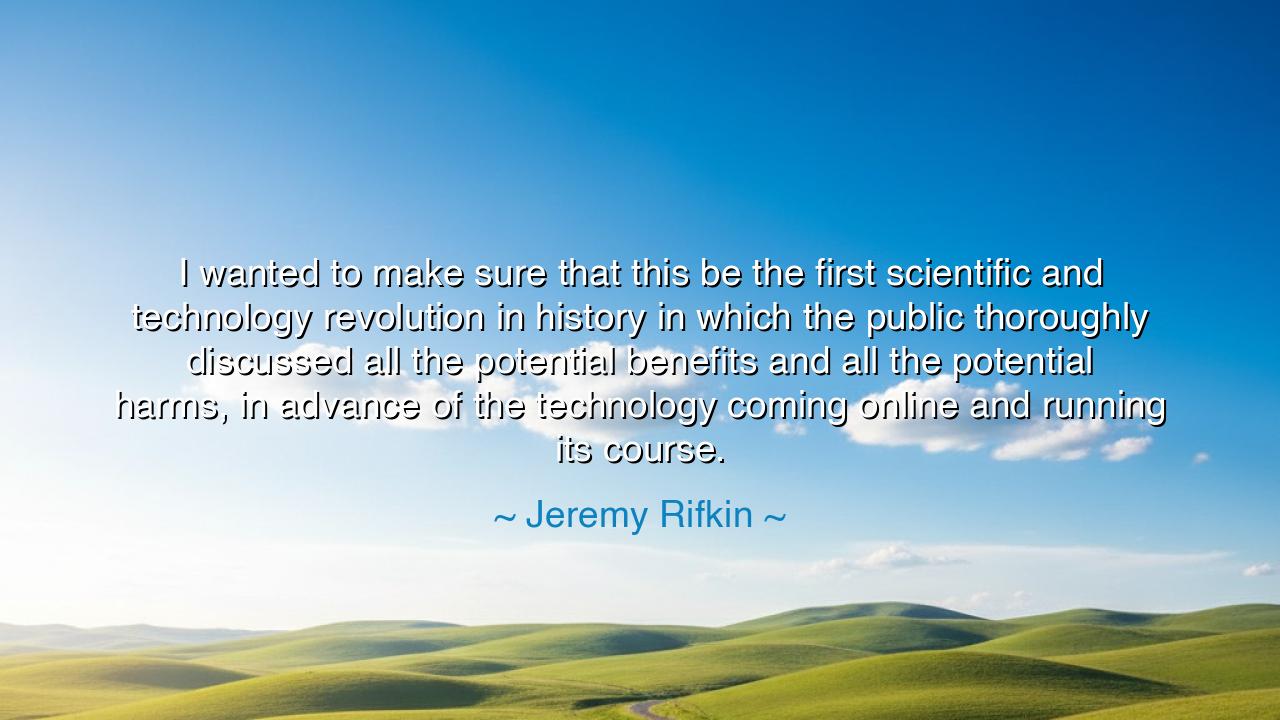
I wanted to make sure that this be the first scientific and
I wanted to make sure that this be the first scientific and technology revolution in history in which the public thoroughly discussed all the potential benefits and all the potential harms, in advance of the technology coming online and running its course.






The words of Jeremy Rifkin, “I wanted to make sure that this be the first scientific and technology revolution in history in which the public thoroughly discussed all the potential benefits and all the potential harms, in advance of the technology coming online and running its course,” resound with the wisdom of foresight. He speaks of a time when technology advances so swiftly that it can reshape life before humanity fully understands it. Rifkin’s insight is a call to pause, reflect, and deliberate, reminding us that progress is not merely measured by invention, but by the conscious stewardship of its consequences. To wield power without discussion is to gamble with the fate of generations yet unborn.
The origin of this wisdom emerges from Rifkin’s work as an economist, social theorist, and advocate for thoughtful technological adoption. In the late twentieth and early twenty-first centuries, as innovations from biotechnology to information technology surged forward, he foresaw a danger: technologies often reach society before ethics, policy, or awareness can catch up. His goal was to ensure that each advance is accompanied by public debate, weighing both benefits and harms, so that humanity may choose its destiny rather than be carried along helplessly by the currents of invention.
History provides haunting lessons of what occurs when such reflection is absent. Consider the Industrial Revolution, which transformed the world through steam engines, factories, and mechanization. While the benefits were vast, so too were the costs: child labor, environmental degradation, and the rise of vast urban slums. Society did not pause to deliberate; the technology ran its course, and only later did public discourse seek to repair the harms. Rifkin’s words echo this history: the first measure of progress should be foresight and conversation, lest invention becomes a sword rather than a tool.
Even more recently, the development of nuclear energy illustrates Rifkin’s concern. Scientists unlocked the atom with extraordinary promise, yet the unleashing of atomic bombs demonstrated the catastrophic consequences of proceeding without thorough societal discussion. While physicists debated morality among themselves, the broader public was largely absent from the conversation. Rifkin’s vision is that the twenty-first century might break this cycle—ensuring that society, as a whole, engages with the ethical, social, and environmental dimensions of every major technological leap.
The meaning of Rifkin’s insight is both urgent and timeless. Technology is a double-edged sword: it can heal or harm, liberate or enslave, enrich or destroy. The measure of humanity is not in invention alone, but in wisdom—the courage to examine, discuss, and guide new power before it acts unchecked. By advocating for public discussion, Rifkin elevates the moral dimension of progress, reminding us that society must participate actively in shaping the path of innovation.
The lesson for future generations is profound: do not allow the marvels of discovery to unfold in silence. Demand engagement, dialogue, and deliberation. Question the implications of each new invention, considering both the benefits it might bring and the harms it might unleash. The strength of a civilization is measured not by what it can create, but by how thoughtfully it directs its creations.
Practical action follows naturally. Educate yourself about emerging technologies. Participate in forums, debates, and community discussions. Encourage transparency from innovators and policymakers. Promote the habit of ethical foresight, ensuring that every technological advancement is accompanied by a clear understanding of its potential consequences. This is the art of responsible progress: combining curiosity with caution, ingenuity with wisdom.
Thus, let the words of Jeremy Rifkin echo across the ages: the first scientific and technological revolution of our era must be guided by discourse, foresight, and moral reflection. Let humanity not stumble blindly into the future, but walk with eyes wide open, weighing promise against peril, and steering invention toward the flourishing of all life. Only then can the fruits of knowledge become true blessings, and only then can progress be rightly called wisdom.






AAdministratorAdministrator
Welcome, honored guests. Please leave a comment, we will respond soon